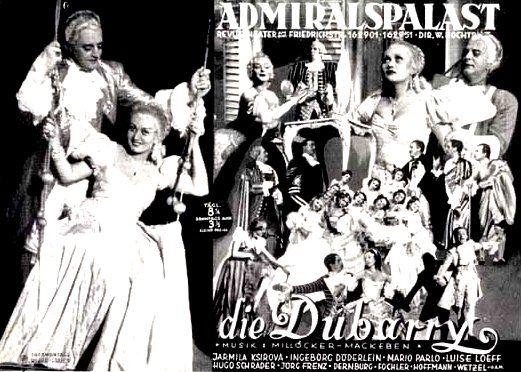
The young milliner, Jeanne, quarrels with the hat-shop owner, Madame Labille, and, unemployed, has to rely on her poet-lover, René Lavallery, for financial support. However, the Comte Dubarry entices her away from the poet’s garret to the Maison Dubarry. Even higher “honours” are on offer, for the Maréchale de France, makes it clear the King is very interested in Jeanne, the “Madame Dubarry”, and is willing to pay the Comte’s debts for a consideration. The Comte is only too ready to make a deal - it seems there are many pimps and procurers at the court of Louis Quinze - and the upshot of it all is, of course, that Madame Dubarry becomes the uncrowned Queen of France.
A radically new version of "Gräphin Dubarry", in nine scenes under the title "Die Dubarry", was prepared by Theo Mackeben with music from the original Gräfin Dubarry as well as other works, and a new text was written by Paul Knepler, Ignaz Michael Welleminsky and E. M. Cremer. This was first given at the Admiralspalast in Berlin on 14 August 1931. According to Andrew Lamb, this introduced "alien structures and orchestration" compared with the original
Aucun dossier informatif complémentaire concernant Die Dubarry

Version 2
The Dubarry (1932-04-His Majesty's Theatre-London)
Type de série: Original LondonThéâtre: Her Majesty's Theatre (Londres - Angleterre) Durée : Nombre : 397 représentationsPremière Preview : jeudi 14 avril 1932Première : jeudi 14 avril 1932Dernière : InconnuMise en scène : Felix Edwardes • Chorégraphie : Anton Dolin • Producteur : Avec : Anny Ahlers (Jeanne), Margaret Yarde (Mme. Labille), Heddle Nash (René Lavallery), Edmund Willard (Comte Dubarry), Helen Haye (Maréchale de France), Lawrence Anderson (Louis XV)Commentaires longs: The original operetta premiered in Vienna in 1879 with libretto by F. Zell and Richard Genee, but despite critical approval, it failed with the public. In 1931 Theo Mackeben created a radically new version of the work, with a new text and added music from other works by Millocker and an interpolation of a ballet by Ravel. (Mackeben was the original conductor of the revolutionary Brecht/Weill “Threepenny Opera). This new version was first given in Berlin in 1931 and went on to great success throughout Europe. The London production ran for 397 performances. It was criticised for its historical inaccuracy, and for its somewhat sensational scenes of immorality, but the public loved it, and it had a successful run of 397 performances. (It was not so successful on Broadway - even starring Grace Moore it managed just 87 performances)

Version 3
The Dubarry (1932-11-George M. Cohan's Theatre-Broadway)
Type de série: Original BroadwayThéâtre: George M. Cohan's Theatre (Broadway - Etats-Unis) Durée : 2 mois 2 semaines Nombre : 87 représentationsPremière Preview : mardi 22 novembre 1932Première : mardi 22 novembre 1932Dernière : samedi 04 février 1933Mise en scène : Morris Green • Chorégraphie : Dorothea Berke • Producteur : Avec : Charles Angelo (Baron Chamard), Jeanne Audree (Suzanne), Fenton Barrett Prince de Soubise, Ethel Britton (Maid to Madame DuBarry), Nana Bryant (Marechale de Luxenbourg), John Clarke (Comte Lammond), Patricia Clarke (Ninon), Joyce Coles (La Camargo)

Version 4
The Dubarry (1947-10-Princes Theatre-London)
Type de série: RevivalThéâtre: Shaftesbury Theatre (Londres - Angleterre) Durée : Nombre : 55 représentationsPremière Preview : mercredi 08 octobre 1947Première : mercredi 08 octobre 1947Dernière : InconnuMise en scène : Hugh Miller • Chorégraphie : Beatrice Appleyard • Producteur : Avec : Irene Manning (Jeanne), Kathleen Williams (Mme. Labille), John Hendrik (René Lavallery), Barry Mackay (Comte Dubarry), Netta Westcott (Maréchale de Luxembourg), Frank Leighton (Louis XV)Commentaires longs: The American singing film-star Irene Manning headed this cast in a lavish production which failed to catch on with neither critics nor audience. Although everyone agreed she sang well, she failed to capture the inherent “naughtiness” of the role.
Pas encore de video disponible pour ce spectacle

.png)
.png)





